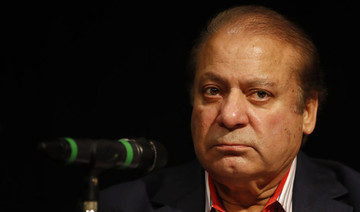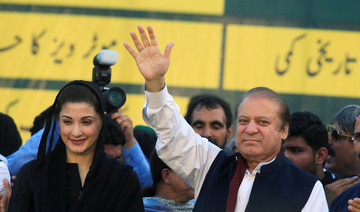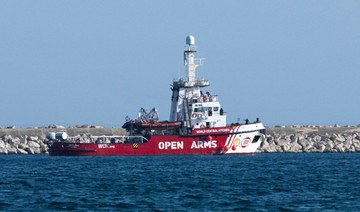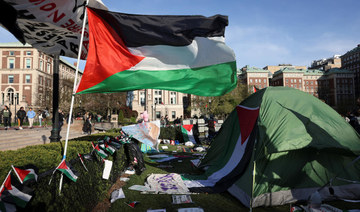ISLAMABAD: A Pakistani court on Monday sentenced former Prime Minister Nawaz Sharif to seven years in prison for corrupt practices linked to the setting up of a steel mill, in a verdict that threatens to end the career of one of Pakistan’s most high-profile politicians of the last four decades.
The accountability court acquitted the three-time prime minister in a second corruption case involving an investment company.
“I’ve never committed corruption so my conscience is clear,” local media quoted Sharif as telling reporters present in the courtroom after the verdict was announced.
Hundreds of Sharif supporters gathered outside the accountability court as a judge ruled on two separate cases that investigated the source of funds to set up two companies, Al-Azizia and Hill Metal Establishment in Saudi Arabia and Flagship Investment in the United Kingdom.
Both companies were established in 2001 when Sharif lived in exile in Saudi Arabia after his government was ousted in a military coup in 1999. Investigations were hinged on the question of how the Sharif family was able to arrange the funds to set up the firms at a time when they were exiled and had no money or assets.
Sharif was taken into custody immediately after the judge read out the sentence and will be incarcerated at Lahore’s Kot Lakhpat Jail. His lawyers are expected to appeal the Al-Azizia verdict at the Islamabad High Court, while the National Accountability Bureau may move the court against Sharif’s acquittal in the Flagship Investment case.
“We have always respected past verdicts and we will respect this one too,” Shahid Khaqan Abbasi, a senior leader of Sharif’s Pakistan Muslim League-Nawaz (PML-N) party, said. “But neither history nor the nation will accept this verdict.”
“These verdicts will God willing be done away with; what will be left behind is Nawaz Sharif’s honesty,” Sharif’s daughter and political heir Maryam Nawaz Sharif tweeted minutes after the sentence was announced. “Remember, when injustice passes a certain limit, it is eliminated.”
Monday’s judgment ends a two-and-a-half-year-long saga of corruption cases involving accusations the Sharif family hid offshore accounts and engaged in money laundering and tax evasion. The cases stemmed from the 2016 Panama Papers’ leaks that first revealed the family had bought luxurious London apartments through offshore companies.
Sharif and his family have repeatedly called the corruption proceedings politically motivated and hinted at collusion between Pakistan’s all-powerful military and the courts to keep the ex-premier and his PMLN party out of politics. On the other hand, Sharif’s opponents have championed the court cases as a rare example of Pakistan’s power elite finally being held to account. The military denies any wrongdoing.
Sharif has served as prime minister thrice but been unable to complete his term all three times. He was removed by a presidential order in 1993 and in a military coup in 1999 after which he went into exile until 2007.
Sharif was elected as prime minister for the third time in a landmark general election in 2013 but his rule was cut short after the Supreme Court disqualified him from office in July 2017 for trying to conceal assets. The court also ordered the opening of three criminal investigations into the Sharif family.
In July 2018, less than two weeks before general elections, Sharif was sentenced to ten years in jail and subsequently arrested in a first case linked to the money trail for the purchase of upscale Avenfield London flats. His daughter Maryam was also jailed for seven years on corruption charges relating to the family’s acquisition of the flats.
Both father and daughter were released on bail after their sentences were suspended by the Islamabad High Court in September, almost two months after Sharif’s party lost elections to the party of new Prime Minister Imran Khan.
On Monday, the accountability court ruled on the last two cases, sending Sharif to jail for seven years.
On December 21, Sharif’s party had announced that an advisory council would run the party’s affairs if he were arrested but it is widely speculated that his daughter will be the real boss.
“The verdict definitely marks the end of hands-on control of the PMLN by Nawaz Sharif and any possibility of him holding office in Pakistan again,” political talk show host Mohammad Malick said.
Sharif’s brother Shehbaz Sharif, the leader of the opposition, is also currently facing cases involving alleged corruption in a low-cost housing scheme and other government projects. Sharif’s daughter Maryam is out on bail in the London apartments’ case but the National Accountability Court has filed an appeal against the suspension of the case. The court is yet to rule on that appeal.
“If Shehbaz [Sharif] is cleared of all cases, then he will take over the [PMLN] party; otherwise all eyes are on Maryam,” Malick said. “But if all three figures are convicted, then that is the end of the PMLN for all practical purposes, at least in its present shape and form.”
Nawaz Sharif, toppled prime minister and political survivor, gets 7 years jail
Nawaz Sharif, toppled prime minister and political survivor, gets 7 years jail
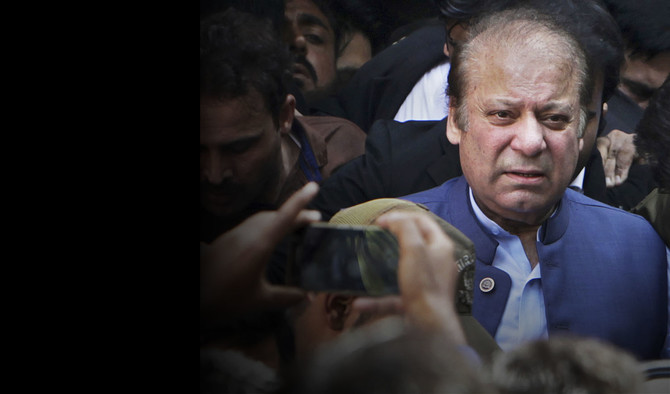
- Sentenced to prison in steel mill case, acquitted in investment company reference
- Verdict threatens end of career of one of Pakistan’s most high-profile politicians
World Central Kitchen to resume Gaza aid after staff deaths in Israeli strike
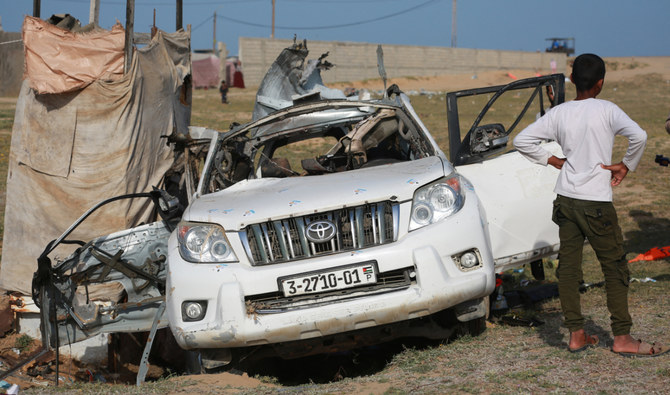
NICOSIA: World Central Kitchen or WCK said it would resume operations in the Gaza Strip on Monday, a month after seven workers of the US-based charity were killed in an Israeli air strike. Prior to halting operations, WCK had distributed more than 43 million meals in Gaza since October, representing by its own accounts 62 percent of all international NGO aid.
The charity said it had 276 trucks with the equivalent of almost 8 million meals ready to enter through the Rafah Crossing and will also send trucks into Gaza from Jordan.
“The humanitarian situation in Gaza remains dire,” said the charity’s chief executive officer Erin Gore.
“We are restarting our operation with the same energy, dignity, and focus on feeding as many people as possible.”
The April 1 deaths triggered widespread condemnation and demands from Israel’s allies, including the US, for an explanation.
Israel said its inquiries had found serious errors and breaches of procedure by its military, dismissing two senior officers and reprimanding senior commanders.
WCK is demanding an independent investigation. Israel’s six-month war against Hamas in Gaza followed an Oct. 7 attack by the militant group in southern Israel when more than 250 hostages were seized and some 1,200 people killed, according to Israeli tallies. Israel’s offensive has killed more than 34,000 people, Palestinian health authorities say, and caused a humanitarian disaster for the enclave’s more than 2 million inhabitants.
“We have been forced to make a decision: Stop feeding altogether during one of the worst hunger crises ever ... Or keep feeding knowing that aid, aid workers and civilians are being intimidated and killed,” Gore said.
“These are the hardest conversations, and we have considered all perspectives when deliberating. Ultimately, we decided we must keep feeding, continuing our mission of showing up to provide food to people during the toughest of times.” (Writing by Michele Kambas; Editing by Andrew Cawthorne)
White House urges ‘peaceful’ campus protests after hundreds arrested
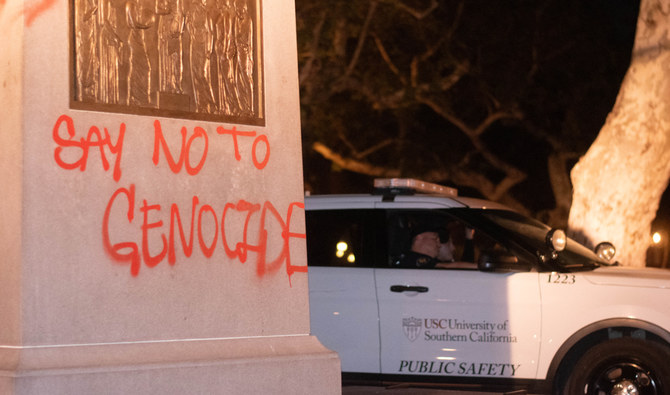
WASHINGTON: The White House insisted on Sunday that pro-Palestinian protests that have rocked US universities in recent weeks must remain peaceful, after police arrested around 275 people on four separate campuses over the weekend.
“We certainly respect the right of peaceful protests,” National Security Council spokesman John Kirby told ABC’s “This Week.”
But, he added: “We condemn the anti-Semitism language that we’ve heard of late and certainly condemn all the hate speech and the threats of violence out there.”
The demonstrations began at Columbia University in New York, but they have since spread rapidly across the country.
While peace has prevailed on many campuses, the number of protesters detained — at times by police in riot gear using chemical irritants and tasers — is rising fast.
They include 100 at Northeastern University in Boston, 80 at Washington University in St. Louis, 72 at Arizona State University, and 23 at Indiana University.
Among those arrested at Washington University was Green Party presidential candidate Jill Stein, who faulted police for aggressive tactics she said provoked the sort of trouble they are meant to quell.
“This is about freedom of speech ... on a very critical issue,” she told CNN shortly before her arrest on Saturday.
“And there they are, sending in the police and creating a riot.”
College administrators have struggled to find the best response, caught between the need to respect free-speech rights and the imperative of containing inflammatory and sometimes violently anti-Semitic calls by protesters.
At the University o Southern California, school officials late on Saturday closed the main campus to the public after pro-Palestinian groups again set up an encampment that had been cleared earlier, the school announced on X.
With final exams coming in the next few weeks, some campuses — including the Humboldt campus of California State Polytechnic University, have closed and instructed students to complete their classes online.
The activists behind the campus protests — not all of them students — are calling for a ceasefire in Israel’s war with Hamas and want colleges to sever ties with Israel.
Ukraine warns front ‘worsened’ as Russia claims fresh gains
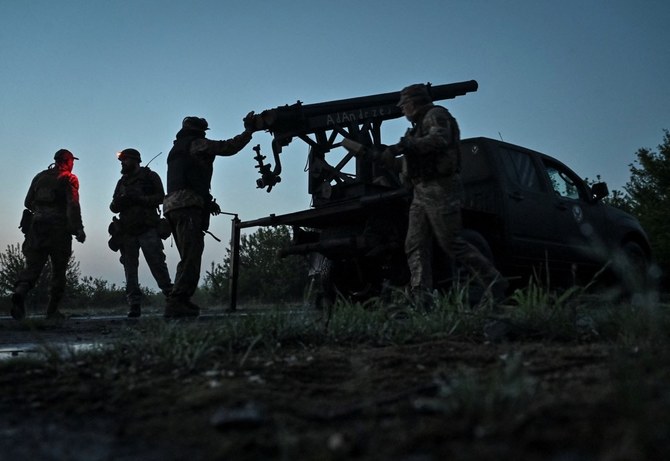
- Russia’s troops are advancing in the eastern Donetsk region
- The US finally approved a $61 billion package of financial aid
VOZDVYZHENKA, Ukraine, April 28, 2024 Agence France Presse: Ukraine’s army leader admitted Sunday that Kyiv’s position on the battlefield has worsened after Russian forces captured another village in the east, pressing their advantage in manpower and ammunition.
Russia’s troops are advancing in the eastern Donetsk region as Kyiv awaits the arrival of much-needed US weapons that it hopes will stabilize the fragile front lines.
“The situation at the front has worsened,” Ukrainian commander-in-chief Oleksandr Syrsky said in a Facebook post Sunday.
Ukrainian troops had “retreated” westwards to new defensive lines in a section of the front that runs past the city of Donetsk, controlled by pro-Russian forces since 2014.
Russia has “a significant advantage in forces and means” and had been able to notch up advances amid “heavy fighting,” Syrsky said.
“In some sectors the enemy had tactical success, and in some areas our troops managed to improve the tactical position,” he added.
Russia’s defense ministry earlier on Sunday claimed its troops had captured the village of Novobakhmutivka in the Donetsk region — around 10 kilometers (six miles) north of Avdiivka, which they seized in February.
The stark assessment of the picture facing Ukrainian troops comes at the end of week of ups and downs for Kyiv.
The United States finally approved a $61 billion package of financial aid after months of political wrangling, unlocking much-needed arms for Ukraine’s stretched troops.
But on the battlefield Russia chalked up more successes.
Its troops managed to make rapid advances in a narrow column to the northwest of Avdiivka.
In the village of Vozdvyzhenka, some eight kilometers from the fighting in Ocheretyne, AFP reporters saw civilians loading a small truck with furniture and belongings on Sunday.
“We’re going a long way from here... I don’t have time to talk because of the shelling,” one of them told AFP, before climbing into the vehicle and speeding out of the village.
Soldiers on the side of a road in the woods said they had originally been sent to build defensive lines.
“But the situation has changed. We were told not to take the shovels but to stay and wait for orders. The Russians are attacking and advancing,” one told AFP, speaking on condition of anonymity.
Syrsky confirmed on Sunday that Russia had made some “tactical” progress in that part of the front, but said Moscow had not yet achieved what he called an “operational advantage.”
He also said additional units were being deployed to replace those that had sustained heavy losses.
The recent setbacks have prompted rare criticism from Ukraine’s military bloggers.
“The (Russian) breakthrough near Ocheretyne revealed a number of problems,” the Deep State Telegram channel, with close links to the Ukrainian army, said in a post on Wednesday.
It said leaders of the 115th mechanized brigade, which is fighting in the area, were “responsible for the collapse of the defense in the entire sector, allowing significant losses.”
Kyiv’s forces are outnumbered across the battlefield, with the country struggling to recruit enough soldiers to replace those who have been killed, wounded or exhausted by the war, now in its third year.
Leaders in Kyiv have warned the military outlook could worsen in the next few weeks, while shipments of US weapons are making their way to the front lines.
“We are still waiting for the supplies promised to Ukraine,” said President Volodymyr Zelensky in his evening address Sunday.
Speaking after talks with Hakeem Jeffries, leader of the Democrats in the US House of Representatives, he said he had once again stressed the urgent need for Patriot anti-missile systems “as soon as possible.”
Ukraine’s head of intelligence at the ministry of defense Kyrylo Budanov said this month that the battlefield situation would likely be at its most difficult in mid-May to early June.
Philippines swelters in scorching heat as mercury hits record high in Manila
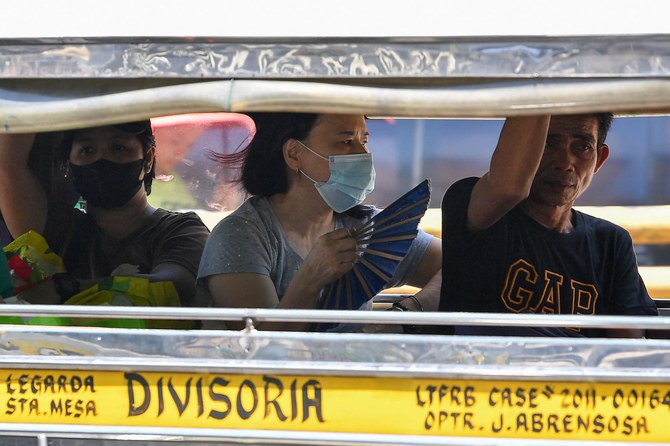
- Children will attend remote classes on Monday, Tuesday in flashback to COVID times
- Temperature in capital’s Metro region could surpass 40 degrees next month, forecasters say
MANILA: The Philippines is bracing for more blistering weather as temperatures in the capital region rose to a record high over the weekend.
Unusually hot temperatures have been recorded across South and Southeast Asia in recent days, forcing schools to close and authorities to issue health warnings.
In Metro Manila on Saturday, the mercury hit 38.8 degrees Celsius, surpassing the previous record set in 1915.
Elsewhere in the country, the weather has been even hotter, with Tarlac province seeing the mercury hit 40.3 degrees earlier in the year.
The hottest ever temperature recorded in the Philippines was 42.2 degrees in 1912.
Glaiza Escullar of state weather agency PAGASA told Arab News it was likely that some parts of the country would continue to see temperatures of 40 degrees and above until the second week of May.
March, April and May are typically the hottest and driest months of the year, but conditions this year have been exacerbated by the El Nino weather phenomenon.
The heat index, which also takes into account humidity, reached 45 degrees on Saturday, which the weather agency classifies as “danger.” It said it could hit 46 degrees on Monday.
“We are issuing a heat index warning just to emphasize that apart from the hot weather or high temperature, relative humidity has a factor in terms of health,” Escullar said.
“If (a person) is dehydrated or he is not in a good condition, the body tends to overheat because the sweating process is slowed down by the high relative humidity.”
In response to the searing heat and a nationwide transport strike, the Department of Education announced on Sunday that all public schools would be closed on Monday and Tuesday but that classes would be held remotely.
Jeepney drivers are staging a three-day strike in protest at the government’s plan to phase out the iconic vehicles.
Many schools in the Philippines do not have air conditioning and several were forced to close earlier this month and hold remote classes in a reminder of the COVID-19 pandemic.
High school student Ivan Garcia told Arab News the soaring heat was affecting his studies.
“The weather is annoyingly hot … I cannot focus on doing my school work,” he said.
Ninth-grader Adrian Reyes said he preferred to work from home.
“I usually leave the house around noontime and it’s really a challenge especially for me and others like me who have to commute to get to school,” he said.
“I prefer the asynchronous mode of learning because we have aircon at home.”
Wiping out polio ‘not guaranteed,’ support needed — Bill Gates
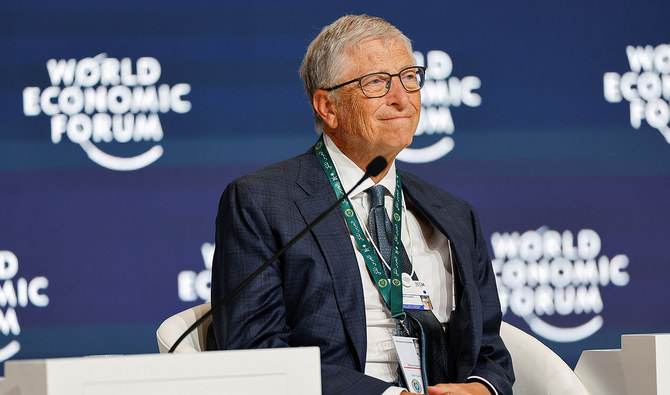
- Pakistan and the neighboring Afghanistan are the only two countries in the world where polio remains endemic
- Gates warned against complacency in tackling the disease as he welcomed $500 million pledge from Saudi Arabia
LONDON: Success in the fight to wipe out polio is not guaranteed, according to tech billionaire turned philanthropist Bill Gates, whose foundation has poured billions into the effort.
Gates warned against complacency in tackling the deadly viral disease as he welcomed a $500 million pledge from Saudi Arabia on Sunday to fight polio over the next five years, bringing it in line with the US as one of the biggest national donors.
However, there is still a $1.2 billion dollar funding gap in the $4.8 billion budget for the Global Polio Eradication Initiative (GPEI) up to 2026, a spokesperson said. The new money from Saudi Arabia will go some way toward closing that.
Saudi Arabia has supported polio eradication for more than 20 years, but the significant increase in funding comes amid a “challenging” situation, said Abdullah Al Moallem, director of health at the King Salman Humanitarian Aid and Relief Center, the kingdom’s aid arm.
Cases of polio, a viral disease that used to paralyze thousands of children every year, have declined by more than 99 percent since 1988 thanks to mass vaccination campaigns.
But the aim of getting cases down to zero, particularly in the two countries where the wild form of the virus remains endemic – Afghanistan and Pakistan – has been held up by insecurity in the regions where pockets of children remain unvaccinated.
“It’s not guaranteed that we will succeed,” Gates told Reuters in an online call last week. “I feel very strongly that we can succeed, but it’s been difficult.”
The support of powerful Muslim countries such as Saudi Arabia would help, he added, particularly in addressing some lingering suspicions about vaccination.
The foundation said it would open a regional office in Riyadh to support the polio and other regional programs.
It is allocating $4 million to humanitarian relief in Gaza, to be distributed through UNICEF, it said. The King Salman Humanitarian Aid and Relief Center will also allocate $4 million, it said.
The first missed target for eradicating polio was in 2000, and the Bill and Melinda Gates Foundation is the largest donor trying to realize that goal.
“If we’re still here 10 years from now, people might be urging me to give up,” Gates said. “But I don’t think we will be. If things go well, we’ll be done in three years,” he said.



